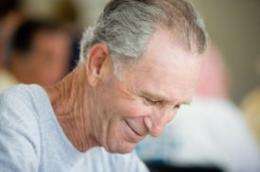Cancer, aging, and too few data are the perfect storm

When an 80-year-old gets cancer, the conventional thinking has been that treatment in most cases would be too risky. A group of geriatric oncologists is pushing a new, national agenda, however, that challenges those assumptions and calls for more research that would provide for evidence-based decisions in the decades ahead.
“We’re seeing very healthy patients in their 80s who are still working, traveling, playing golf, swimming at the YMCA, and suddenly they get cancer. How can you not consider treating that patient?” said Supriya Mohile, M.D., M.S., who operates a geriatric oncology clinic at the James P. Wilmot Cancer Center at URMC, one of the few specialized clinics in the country. “We are trying to educate the thought-leaders in oncology of the need for hard data to address the unique situation of older people with cancer.”
Mohile is among the top specialists in this field, who were invited to deliver educational lectures June 3- 7, 2011, at the American Society of Clinical Oncology (ASCO) annual meeting in Chicago, a gathering of the world’s cancer experts. Their goal is to move geriatric cancer care to the forefront, in step with a rapidly aging United States population.
A key message among the geriatrics presenters is this: By 2030 more than 20 percent of Americans will be older than 65. Yet physicians are not ready for this demographic shift, as no consensus exists within the geriatric or oncology communities regarding standards of care for their oldest patients.
The lack of consensus and gap in data is a result of several factors, Mohile said. First, most clinical trials are geared toward young or middle-aged adults, and thus do not directly address the typical problems of aging such as a reduced physiologic reserve (organs slow down), and changes in the way our bodies process drugs. Also, most clinical trials measure outcomes in terms of duration of life rather than preservation of an active life. And finally, no studies currently use the comprehensive geriatric assessment, a tool that evaluates a person’s physiological age rather than chronological age by looking at factors such as frailty, cognitive function, physical performance, and number of comorbid medical conditions like high blood pressure, diabetes, or arthritis.
Mohile is one of three physicians who received a five-year U13 grant from the National Institute on Aging and National Cancer Institute to conduct conferences with health-care leaders. Her colleagues are Arti Hurria, M.D., at City of Hope in Duarte, Calif., and William Dale, M.D., Ph.D., at University of Chicago.
Mohile and Hurria have collaborated to compile data and share it with colleagues. For example, in a session at ASCO chaired by Mohile, the investigators will discuss the results of a new study, led by Hurria, on the prediction of chemotherapy toxicity in older patients.
The trial consisted of 500 people ages 65 or older who had been diagnosed with various types of cancer and were schedule to receive chemotherapy. More than half of the patients (53 percent) experienced severe to life-threatening side effects during treatment.
Researchers, however, were able to pinpoint the factors most associated with an increased risk of developing severe toxicities. The factors included an age of 73 or older, having a gastrointestinal or genitourinary cancer, one or more falls in the last six months, inability to walk one block, and hearing impairment.
Researchers also found a rational explanation for why each risk factor may predict toxicity, such as decreased bone marrow reserve, and concluded that the seventh decade of life represents a time of increased general vulnerability. The risk factors will be presented as guidelines that oncologists can apply in their daily practice when weighing decisions about chemotherapy and other difficult treatments.
“We face nuances every day in the clinic that need to be addressed with research – such as the seemingly fit individual whose unseen medical problems might put him at risk for life-threatening toxicities, versus the apparently frail person who could actually tolerate aggressive treatment,” Mohile said. “It is critically important that oncologists learn to assess elderly people correctly. We are proud that our studies and our educational seminars begin to fill this gap in knowledge.”
Mohile’s mentor, John M. Bennett, M.D., professor emeritus at the URMC, also receives a special award at ASCO.













